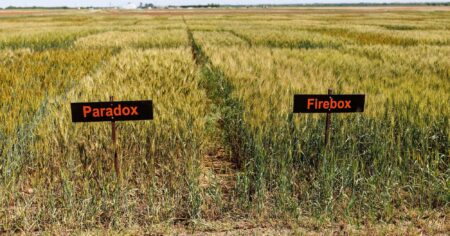1. Grain, Soybean Futures Decline Overnight
Grain and soybean futures were lower in overnight trading as the dollar strengthened and on favorable weather in global growing areas.
The greenback gained 0.2% against a basket of its global counterparts overnight. A stronger dollar makes U.S. goods including agricultural products less attractive to overseas buyers.
The dollar has been choppy in recent trade amid volatility due to the global trade war between the U.S. and several countries.
Also weighing on prices overnight is favorable weather in some growing areas of the world.
Rainfall continues in much of northern Brazil, the world’s largest exporter of soybeans, giving a boost to soil moisture in the region. More precipitation is forecast for much of the country this week.
Soybean production in Brazil was estimated by the U.S. Department of Agriculture at 169 million metric tons. If realized that would be up from 154.5 million tons a year earlier and the highest output on record.
Corn output in the South American country is seen by USDA at 126 million metric tons, up from 119 million tons last year.
Corn futures for July delivery fell 5½¢ to $4.80 a bushel overnight on the Chicago Board of Trade.
Wheat futures dropped 8¾¢ to $5.36¼ a bushel, while Kansas City futures lost 9¼¢ to $5.41¾ a bushel.
Soybean futures fell 5¼¢ to $10.54 a bushel. Soymeal was down 80¢ to $297.70 a short ton, and soy oil lost 0.51¢ to 49.3¢ a pound.
2. Investors Cut Net Longs in Corn, More Bullish Beans
Investors reduced their net long positions, or bets on higher prices, in corn last week while reducing their bullish wagers on soybeans, according to data from the Commodity Futures Trading Commission.
Money managers cut their net longs in corn to 132,414 futures contracts in the seven days that ended on April 22, the agency said.
That’s down from 145,154 contracts the previous week.
Speculators, however, raised their bullish bets on beans to 53,245 futures contracts, CFTC said. That’s up from 43,348 contracts the week prior and the largest such position since Feb. 4.
In wheat, hedge funds and other large investment houses cut their net short positions, or bets on lower prices, to 81,861 futures contracts form 86,238 contracts a week earlier, marking the smallest such position since March 18.
Investors raised their net shorts in hard red winter wheat to 51,618 futures contracts from 42,881 contracts a week earlier, CFTC said in its report.
The weekly Commitment of Traders report from the Commodity Futures Trading Commission shows trader positions in futures markets.
The report provides positions held by commercial traders, or those using futures to hedge their physical assets; noncommercial traders, or money managers (also called large speculators); and nonreportables, or small speculators.
3. Dry Weather Expected in Parts of Kansas
Red flag warnings have been issued for parts of southwestern Kansas amid intense winds and low humidity, according to the National Weather Service.
Winds will be sustained throughout the day from 15–25 mph and gust up to 30 mph, the agency said.
Relative humidity will drop as low as 10%.
Wind advisories have been issued for much of North Dakota and parts of surrounding states, NWS said.
Winds will gust up to 55 mph in central North Dakota today and tonight.
“Gusty winds will blow around unsecured objects,” the agency said. “Tree limbs could be blow down and a few power outages may result.”


:max_bytes(150000):strip_icc()/DC-5ec71dd349104ec287b318f05ebf5f74.jpg)
:max_bytes(150000):strip_icc()/SFCE_Sp25_WortheyFarmersMarket_preview1-9c3c0b2c5e9444249fa60594b7f30fec.jpg)
:max_bytes(150000):strip_icc()/TaylorsFireworkssign-c3dd3eb41cc646c593dbebfee850bdc0.jpg)


:max_bytes(150000):strip_icc()/Texas20Corn20Planting18-f00c5936b15a43469e487716b3e8638d.jpg)

:max_bytes(150000):strip_icc()/diseaseplaybookcorntarspot-fb7ff9d7c32e4e63b3e5e97dbe406eeb.jpg)
